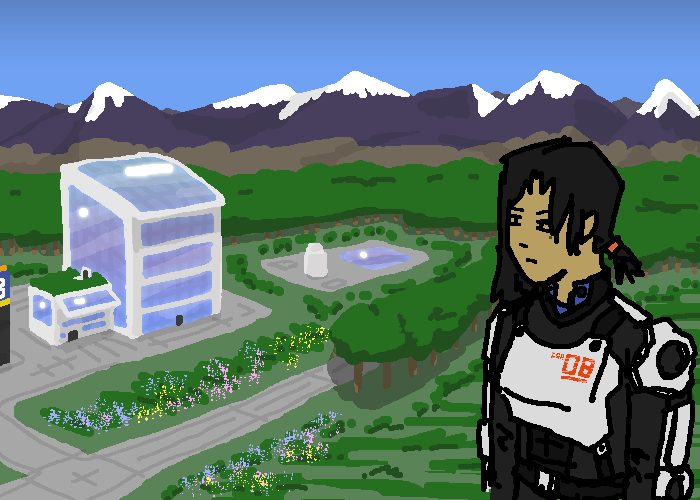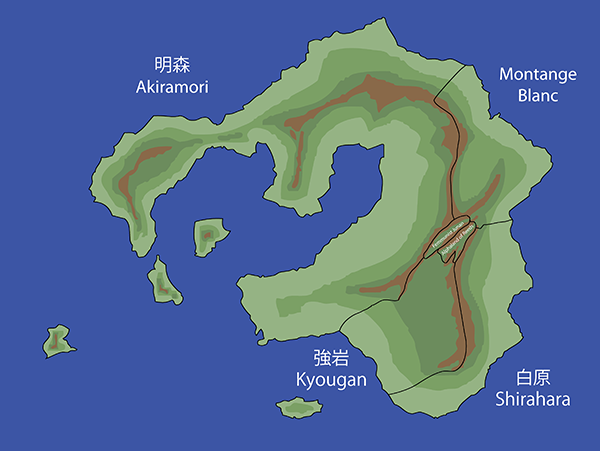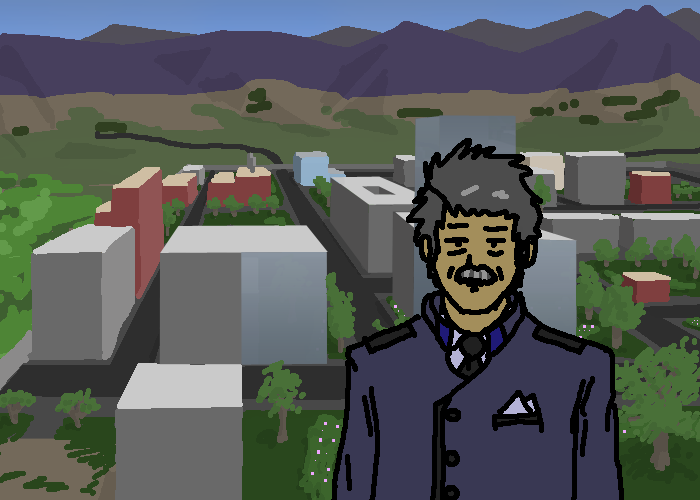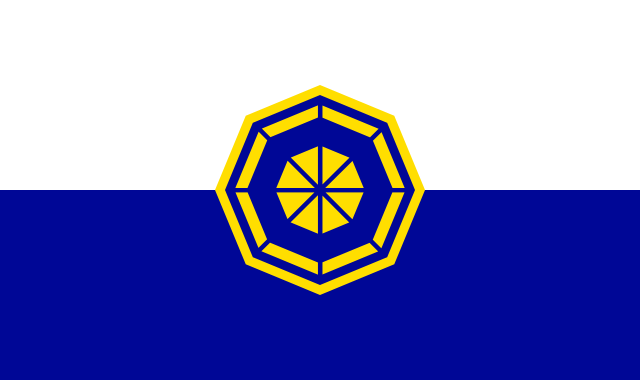
 Greater Technocratic Akiramori
Greater Technocratic Akiramori
| Region |
Elprus |
| Alignment |
Futurists |
| Year |
2016 |
| Tech |
MT/MT+ |
| Capital |
Kurozu (黒津) |
| Government |
Parliamentary DCO
Stratocratic Republic |
| Ruler |
Coco J. Riley (Prime Minister) |
| Population |
116,280,000 |
| Land Area |
765,000 km2 |
| Density |
152/km2 |
| GDP |
$9,567 billion |
| GDP / capita |
$82,282 |
| Languages |
Akiranese, French |
| % Newsex |
78% |
Akiramori (明森)
Overview
A rainy nation split between thick green forests and dense cities, Akiramori is a highly-competitive, technology-focused stratocratic republic ruled by think tanks that act as voter delegates. Its enormous energy requirements are met primarily by advanced nuclear power plants.
The export-focused economy is primarily driven by a combination of biomedical technology, aerospace, information technology, commercial nuclear technology, and media exports. While a spectrum of welfare programs exist, income inequality remains relatively high.
Completed secondary education and a period of either military or civil service are required to vote, a condition enshrined in the nation's constitution. Votes are delegated in twelve categories to Delegate Candidate Organizations (DCOs), which bet on the outcomes of legislation to determine their level of public funding. The top 100 DCOs form the legislature. 'Executive' is a category by itself, effectively resulting in popular election of the Prime Minister during most elections.
Around 78% of citizens (and over 95% of those under 25) are of a genetically-altered "newsex" (functional intersex) type, which is difficult to distinguish from women to most people. The previous military dictatorship spread the virus responsible in the 1930s and 1940s in order undermine and destroy gender supremacist militias fighting in the countryside. Many foreign countries consider the initiative a medical atrocity due to issues of consent and scientific arrogance. The sharp generational change involved lead to some unusual cultural conflict.
Due to a complex scheme of incentives, only the wealthy grow fat on triple-fried hamburgers, while the poor subsist on a diet more suitable for aging gurus, yoga practitioners, and personal fitness instructors. An enormous tax on the purchase of controlled drugs without prescription subsidizes the development of new pharmaceutical drugs. Citizens workout in monitored gyms, attend training camps, and own weapons in order earn enough yearly "Defense Points" to avoid paying the National Defense Readiness Tax.
The ruthless fashion culture has turned Augmented Reality Heads-Up Display glasses from a niche oddity into a requirement to be taken seriously. Competitive video game tournaments take place at beachside resorts, while professional laser tag is aired during prime time sports lineups. A guild and lobbying organization has seized control of the market for prostitution, requiring a 2-year degree to enter the field, which has accidentally raised the social status of sex workers. Single-sex bathrooms haven't existed since 1972. The nation's beaches are known throughout the world for their white sands, beautiful waves, friendly dolphins, and deadly shark attacks.
Culture
Sex and Gender
When the newsex were created, it was thought that they would bring about a new era of harmony and an end to "objectification." The new generation was celebrated as the birth of a new era of gender liberation. However, instead of eschewing either male or female criteria for mate selection, the newsex embraced them both simultaneously. The resulting society is extremely competitive for status across nearly all major axes, including wealth, power, fame, personality, appearance, dominance and submission, sex, talent, and intelligence. Those who stand out on one or more axes have almost unlimited access to high-status partners, while those who do not are looked down upon by society. Most newsex prefer to have a partner higher status than themselves.
Focus on appearance and what the Femmunists described as 'sexual objectification' did not decrease. Rather, the fashion and cosmetics industries have exploded as appearance-consciousness is at an all-time high. The "male gaze" lost its name as visual sexualization applies to all sexes in most movies, and the pressure is constant. Masculinists' complaints about viewing men as 'success objects', that are otherwise expendable, came to be reflected in the daily existence of all newsex. Everyone is judged by their attractiveness. Everyone is viewed as expendable.
As sex became more casual, it became another avenue for status competition, to the point that many in the culture are questioning whether current sex norms are psychologically healthy or even physically safe. Polygamy was re-legalized in 1982 in an attempt to make up for falling marriage rates, and is now used by the high-status to have multiple lower-status spouses, by middle-status people to form extended families, and by entertainers (such as bands) for business reasons. The average age difference in monogamous marriage is now six years, as older newsex marry down for attractiveness while younger newsex marry up for success. Men are preferred due to a combination of rarity making 'having' one a status symbol, and lack of status competition on certain axes reducing the burden of personal judgment.
Living Conditions
As the country industrialized, effective urban planning became a major priority for the military government. The construction of medium-density housing estate campuses dominated the 60s and 70s. These estate campuses provided limited mixed-use facilities and were built as an integral unit - they are villages or communities within a single city meta-block. As an unexpected effect, the people began to cluster according to interests and vocation. When the first major cohort of urban newsex started to reach adulthood in the late 60s and early 70s, the process of cultural self-segregation accelerated, as sex gaps in interests and employment evaporated. Thus children of the 70s may have been surrounded almost entirely by adults who were technology experts, or artists, or business analysts and management personnel. The estates themselves clustered in areas depending on specific industries, leading to further impacts on schools. This "super-specialization" was ultimately more efficient at producing experts and soon became the only way to attain the highest jobs in a given field in the country, but has led to increasing subcultural fragmentation. These estates also reset local status expectations, encouraging increased competition as "normal" seems higher. Many have become associated with specific corporations.
The creation of the housing estate campuses has had a profound impact on urban development, which tends to have very dense public transportation relative to cities in foreign countries. A competitive bidding system, in which companies bid for the most desirable starting and ending times, and the money is used to offset the cost for companies operating at off-peak hours, further increases the throughput of the public transport network. On any train or bus, citizens can access a route planning system that will tell them how to get to their destination, and what time they can expect to arrive.
The housing estates themselves contain at least 40% green space by law. From the air, Akiranese cities resemble thick gray nets over a green surface.
Social Reputation Networks
In the early 00s, a new type of social reputation networking software was introduced to "promote pro-social behavior." These reputation networks apply one of more reputation scores to people, as a representation of their social status. Accounts are verified and limited to one per person. Though intended to bring people together, they accelerated the process of subcultural separation, as well as introducing increased pressure for social conformity. After a time, high scores were used to allow celebrities access to elite housing campuses, and then expanded to normal people, websites, and even hiring.
Not everyone uses the same networks, and sometimes a positive reputation in one will lead to a negative reputation on another. There are well over a thousand reputation networks, but most of the networks are managed by social networking company AKB. The biggest six are K ("Kurozu" - politics), M (military), B (business), AC ("Academic Consensus" - academia, also based on scaled impact factor), V ("Vanguard" - art), and J (pop culture). Reputation scores are managed through smartphones, websites, and so on. Those with a lot of score weight assigned to them by others can assign more rep per transaction.
Media
Modern Akiranese consumer media is dominated by a mix of oversexualized fan service, crass commercialism, and short turn around times. There is an extremely wide variety of content, so long as the content you want is low-budget and saucy. Pop music is dominated by electronica with vapid sexualized lyrics and auto-tuned voices. Animation is dominated by ecchi comedy harem shows. Reality TV has become X-rated. Comments below the video for every newscaster are dominated by jabs at appearance. Radical new fashion trends rock the nation each year, then are just as quickly forgotten.
Not everyone agrees with this direction, however. In 2003, the guerilla art collective Deconstruction::WAVE made its debut by staging an elaborate hoax in which they appeared to hold the Mona Lisa hostage while dressed as foreign terrorists, threatening to "behead" the famous painting. This became an international scandal for 72 hours, until it was revealed that original painting had been simply moved to a storage area in the national museum. Along with a number of creators, they have launched the so-called "Revolutionary Wave School" across a variety of mediums, seeking not only to develop better and more meaningful art, but also to critique the culture of Akiramori itself. Guerrilla elements have persisted with the vandalism of public advertisements, hacking attacks defacing websites, sabotage of certain commercial events, and so on. More conventional Revolutionary School activity such as animation has just begun to trickle into the mainstream.
Akiramori has one of Elprus's most cutting edge grafitti scenes, even though it remains illegal. Those who simply spraypaint their name everywhere are shunned by the community as "not representing the true revolutionary spirit." Artists have developed entire fake "painting crew" setups just to put up more elaborate murals for status and subversiveness.
Education
Starting from middle school onward, schools assign 'points' to students for attendance, grades, relative academic standing, and extra-curricular activities. These points can be spent at participating retailers for a variety of goods, including any of 2,400 approved "Blue Label" school uniform parts. This system was found to correlate with improved academic performance and post-graduation financial literacy.
Government funding for tertiary education is based on performance multiplied by the economic desirability of the specified course of study. While this has improved the efficiency of the labor market (and cut down on the number of Albislesian Pre-History majors), it tends to overcorrect, thus many students don't take the most compensated course of study.
Transportation
Most Akiranese use public transport as their primary form of transportation, but there are technically more motorcycles in the country than licensed motorcycle riders. Motorcycles are extremely popular due to the influence of motorhead culture in early post-war film, just as many newsex were growing up. The jacket-and-sunglasses-wearing sport-cycle-riding newsex image is considered 'standard cool'. Sports cars are less popular, and large trucks are very unpopular. (Most cars are small commuter cars.)
Style
Outside of this, futuristic aesthetics are preferred, and many Akiranese dress "like it's the year 2025." Electronica is considered the default music. Architecture attempts to look quite futuristic, though with the modernist aesthetic becoming a bit too common, a "Neo-Traditionalist Modernism" has become the new wave. Having the newest electronics, reading the newest hottest books, reading the trendiest comic books and keeping up with the latest television shows are considered important.
The Virus
RV2081 has many nicknames now, but its only official name remains its designation from when it was discovered in 1921. Originally affecting only 1 in 10,000 Akiranese, approximately 3/5 of whom were latent and did not show overt symptoms, it was considered little more than a curiosity by the traditionalist Kingdom of Akiramori. It was not until 1926, after the military coup, that research into the virus started in earnest.
RV2081 is a very large virus containing an unusually complex genome, some of which appears to be from an unidentified species of animal. Once inside an adult host, it infects the reproductive tissue, altering the genomes of the host's gametes. In this latent stage, the host is an unwitting carrier, experiencing only minor and occasional side effects. Latent hosts don't noticeably change. Only their future offspring do. The virus can still be spread in this stage by exchange of some bodily fluids, though transmission is not certain.
The active stage comes following fertilization. RV2081 alters the sex of the resulting offspring into a functional intersex state, which has an overall feminine outwards appearance (though they are generally taller and put on muscle more easily than the typical woman). (Scientists later discovered RV2084, and several earlier strains that didn't spread as far due to producing a more androgynous appearance.) RV2081 has been proven to modulate hormonal response in complex ways at various points in development. Offspring conceived by hosts of RV2081 are also contagious hosts of RV2081.
The full long-term effects of RV2081 are still unknown, though initial active subjects interviewed and analyzed in the 30's did not seem to be in obviously poor health. Since then, more side effects have been determined, such as increased risk of depression, bipolar disorder, gender dysphoria, lower overall fertility, and some male-typical diseases. Active RV2081 hosts have an expected lifespan closer to that typical of men.
The term "newsex" did not originate in the medical literature, but rather in an advertisement campaign by the dictatorship government promoting deliberate infection with RV2081. (They are sometimes also called "virals", considered a derogatory term.)
"Natural" Akiramorinese are the most vulnerable to RV2081 for genetic reasons. Its natural rates of single-exposure transmission are one order of magnitude lower in other Typhoon Islanders including Kyouganese (1/1,307), and two orders of magnitude lower in outsiders (1/9,384).
History




